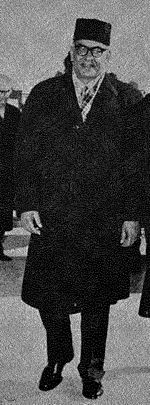Malik Feroz Khan Noon
Sir Feroz Khan Noon ( Panjabi فیروز خان نون , Urdu ملک فیروز خان نون; * May 7, 1893 in Punjab ; † December 9, 1970 in Nurpur Noon , Punjab , Sargodha district ) was a Pakistani politician .
Life
Feroz Khan Noon came from one of the most influential land-owning families in Punjab . He studied at the University of Oxford, England, and then held numerous posts in the British Indian government and later in Pakistan . He also played an important role in the “Pakistan Movement”.
From 1936 to 1941 he was India's High Commissioner (Ambassador) to the United Kingdom . In 1947 he was sent as a special envoy to a number of countries in the Islamic world by the founder of Pakistan, Muhammad Ali Jinnah . The aim of this mission was to introduce Pakistan, explain the reasons for its creation and solicit moral and financial support.
From 1953 to 1956 Noon was Prime Minister ( Chief Minister ) of the Punjab Province , then - until 1957 - Foreign Minister . On December 16, 1957, Noon became the seventh Prime Minister of Pakistan. He lost this post on October 7, 1958, when Pakistani General Iskander Mirza declared martial law on Pakistan.
Noon also wrote five books, including his autobiography ( "From Memory" ).
He was married to Begum Viqar un Nisa Noon , who worked as a social worker all her life to improve the lot of the people in Pakistan.
In 1933 he was knighted as a Knight Bachelor . In 1937 he was also accepted as Knight Commander in the Order of the Indian Empire and in 1941 as Knight Commander in the Order of the Star of India .
Noon died on December 9, 1970 in his home village Nurpur Noon, near Bhalwal in the Sargodha district (Pakistan).
Individual evidence
- ↑ a b c d Knights and Dames: MIG-OS at Leigh Rayment's Peerage
| personal data | |
|---|---|
| SURNAME | Noon, Malik Feroz Khan |
| ALTERNATIVE NAMES | Noon, Sir Malik Feroz Khan |
| BRIEF DESCRIPTION | Pakistani politician |
| DATE OF BIRTH | May 7, 1893 |
| PLACE OF BIRTH | Punjab |
| DATE OF DEATH | December 9, 1970 |
| Place of death | Nurpur Noon , Sargodha District |
